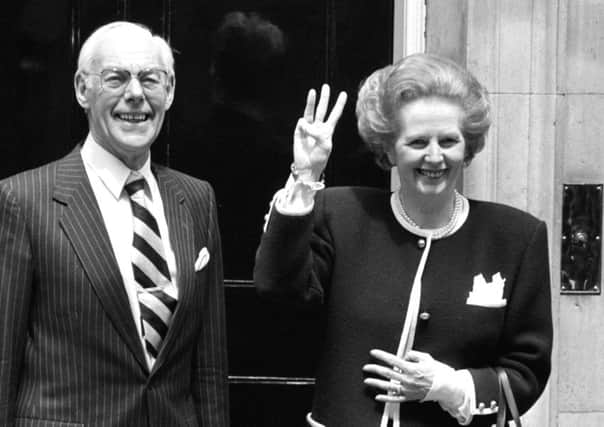'˜No help to us...' Thatcher's view of McCartney


Documents from the time, newly released today, reveal that Mr Thatcher – not a figure noted for his interest in popular culture – was allowed to “red pencil” a celebrity guest list for a showbusiness reception planned by Downing Street.
He let pass without comment the inclusion of the actor Baron Fellowes of West Stafford – who, as Julian Fellows, would later create Downton – but placed a question mark beside the not-yet-knighted Paul McCartney.
Advertisement
Hide AdAdvertisement
Hide AdThe reception, in April 1988, to be attended by Mr and Mrs Thatcher, was planned as a thank you to the 45 celebrities who attended the Wembley Rally during the Conservatives’ 1987 General Election campaign.
But the Prime Minister had decided that more guests were needed, and a longer list of “a possible 229 without spouses” was drawn up. Some were at the suggestion of the former Culture Secretary John Whittingdale, who was then political secretary to Mrs Thatcher.
But Mr Thatcher went through the list with a red pen, marking ticks against those he “would personally like to see included” and question marks beside “those who, I believe, do not help”.
McCartney, along with the magician Paul Daniels, a public supporter of the Conservatives, both had question marks written beside their names.
Advertisement
Hide AdAdvertisement
Hide AdThe newsreader Jan Leeming, singer Shirley Bassey, and the comedian Janet Brown – who was noted for impersonating Mrs Thatcher – were also question-marked, as was the Sheffield athlete and Conservative politician, Sebastian Coe.
Among the ticked names was those of Rolf Harris and Andrew Lloyd-Webber. But Mr Thatcher’s favourites were the presenter Judith Chalmers, whom he ticked twice, and the comedian and writer Eric Sykes, the only name to get three ticks.
Penelope Keith, who was at the time the star of To The Manor Born on the BBC, was ticked twice, as was Ronnie Corbett. But his co-star, Ronnie Barker, was ticked only once.
Mr Thatcher, in a note to the No 10 Private Office, wrote: “Whilst I accept of course that not everyone who comes to our receptions are necessarily on ‘our’ side I find it both unpleasant and embarrassing to entertain those who publicly insult the PM.
Advertisement
Hide AdAdvertisement
Hide Ad“This list therefore needs some careful checking in this regard.”
He explained that more than one red tick “means super person and a known friend and wonderful to have them here”.
Chris Collins, of the Margaret Thatcher Foundation, said it was “unusual” for Mr Thatcher to have involved himself to such lengths, but that his interest may be explained by an earlier episode in which his wife considered suing the BBC Radio 4 Today programme for libel over a satirical story, titled Thatcherism: The Final Solution, in 1988. Denis wrote that never had “so foul a libel been published against anyone let alone a Prime Minister”.
Mr Collins said: “The coded system of question marks and ticks and crosses – that’s actually slightly unusual. I think perhaps he was in a somewhat irritable frame of mind and maybe the story about the BBC helps to explain that.
Advertisement
Hide AdAdvertisement
Hide Ad“Certainly the steam is coming out of his ears at various points in 1988 and this party he jumps on.”
In the end the longer guest list was dropped in favour of the original 45 plus the Parliamentary Skiing Team and the British Winter Olympics Squad.
Eddie “the Eagle” Edwards, who competed in the ski jump that year, was invited but could not attend because the date clashed with a charity event.